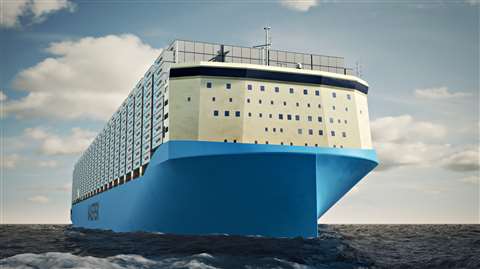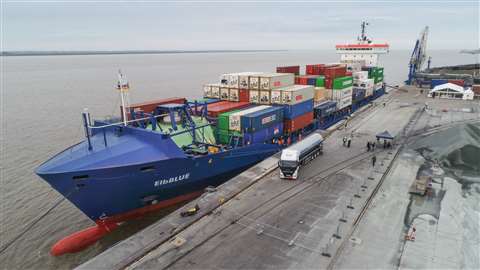FuelEU Maritime regulation comes into effect
29 March 2023
 FuelEU Maritime is intended to promote introduction of ships using green energy, such as this methanol-fuelled concept from Maersk (Photo: Maersk)
FuelEU Maritime is intended to promote introduction of ships using green energy, such as this methanol-fuelled concept from Maersk (Photo: Maersk)
The European Parliament and Council has announced that it has passed the FuelEU Maritime agreement, intended to promote the use of cleaner fuels and energy across commercial shipping in the region.
The new EU regulation outlines a gradual decline in the greenhouse gas intensity of fuels used by the shipping sector, with a targeted reduction of 2% by 2025 and as much as 80% by 2050.
“Ships must and will shift away from fossil fuels and towards greener alternatives,” said Adina Vălean, commissioner for Transport. “With the long-term outlook of this agreement, we are sending a clear signal to the sector across the value chain, from ship owners and operators to fuel producers, shipyards and equipment manufacturers, that it is worthwhile and necessary to invest in sustainable maritime fuels and emissions technologies.”
The deal complements a provisional agreement reached in late 2022 which saw shipping emissions included in the EU Emissions Trading System.
According to the European Commission, waterborne transport accounted for between 3 and 4% of total CO2 emissions across the trading bloc in 2021. While there was a drop in 2021 volumes due to the COVID pandemic, demand for container transport is expected to rebound and exceed previous levels.
Proportional increases
FuelEU Maritime will help decarbonise the shipping sector by setting maximum limits on the annual greenhouse gas intensity of the energy used by a ship. Those targets will become ‘more ambitious’ over time, with the intent of reflecting expected developments in engine technology and production of renewable and low-carbon fuels.
The targets cover production of CO2, plus methane and nitrous oxide emissions over the full lifecycle of the fuels.
The new rules also introduce an additional zero-emissions requirement at berth. These mandate the use of an on-shore power supply or alternative zero-emission technologies in ports by both passenger and container ships. This should help control air pollution in ports, which are often close to densely-populated areas.
 FuelEU Maritime further stipulates that ships use green energy sources while docked
FuelEU Maritime further stipulates that ships use green energy sources while docked
FuelEU Maritime also provides for a voluntary pooling mechanism. This will allow ships to pool their compliance with one or more ships, to where greenhouse gas intensity limits achieve an acceptable average.
It is anticipated that the introduction of FuelEU Maritime will promote large-scale production of sustainable maritime fuels, both ensuring the availability of green fuels and reducing the price difference between sustainable and fossil fuels. A special incentive scheme has been included to support the uptake of fuels from a non-biological origin with high decarbonisation potential.
The report published by the European Commission covering the FuelEU Maritime agreement made no mention of how engine manufacturers should respond to the guidelines. A series of companies which deliver engines for shipping vessels are currently developing/launching engines capable of using low-carbon fuels into the market, but numbers of those in service are very low.
The agreement appears to assume that the extended roll out of the programme will coincide with the decommissioning of vessels fitted with fossil fuel engines and the upgrade or commissioning of those to support low- or zero-carbon fuels.
The European Commission further made no mention of how FuelEU Maritime will be enforced, whether it will be a self-reporting process or actively enforced via existing registration documentation. Diesel Progress has asked the EC for comment on both points.
Moving forward
The FuelEU Maritime agreement must now be formally adopted. Once this is completed, the new rules will be published by the Official Journal of the European Union. They will be enforceable 20 days after publication.
The new agreement will play a key part in the EU’s European Green Deal, which has the goal of making Europe climate-neutral by 2050. To achieve this target, it is understood that Europe must reduce its total emissions by at least 55% by 2030, compared to 1990 levels.
Maritime transport is reported to account for 75% of the EU’s external trade volumes and 31% of internal volumes. The maritime sector almost entirely relies on fossil fuels. To achieve climate neutrality, the EU needs to reduce emissions from all transport by 90% by 2050. This will be crucial for the EU to reach its climate objective under the Paris Agreement.
STAY CONNECTED




Receive the information you need when you need it through our world-leading magazines, newsletters and daily briefings.
POWER SOURCING GUIDE
The trusted reference and buyer’s guide for 83 years
The original “desktop search engine,” guiding nearly 10,000 users in more than 90 countries it is the primary reference for specifications and details on all the components that go into engine systems.
Visit Now
CONNECT WITH THE TEAM










